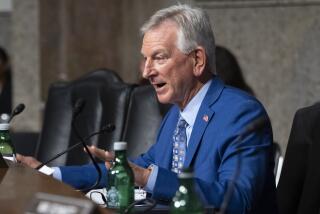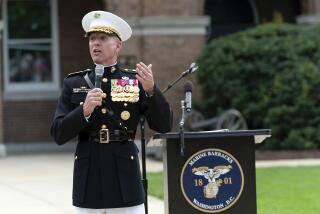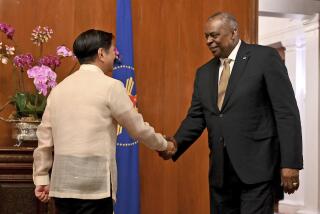Aquino Retires 20 Generals in Reform Effort
MANILA — President Corazon Aquino on Tuesday announced the forced retirement of 20 top generals, among them men fiercely loyal to the military chief of staff, Gen. Fidel V. Ramos, in a move meant to cleanse and streamline the armed forces.
At the same time, Aquino extended for six months the terms of 11 other generals and colonels whose mandatory retirement was due Tuesday--an act that critics assailed as a violation of Aquino’s campaign promise to retire all “overstaying” generals.
Under former President Ferdinand E. Marcos, there were as many as 60 generals whom Marcos permitted to remain active beyond the retirement age, primarily because of their personal loyalty to Marcos, his family and friends.
Caused Morale Problems
The presence of so many aging and sometimes corrupt military commanders has caused deep morale problems within the 200,000-man Philippine military, and Aquino vowed during her presidential campaign earlier this year to immediately retire 23 generals who were serving beyond retirement age at the time.
Five days after taking office Feb. 25, Aquino did retire the 23 men, among them the commanding generals under Marcos of the air force, navy, army and marines, and Marcos’ military chief of staff, Gen. Fabian C. Ver, who fled with him to Hawaii last month.
The 20 additional generals whom Aquino retired Tuesday had reached their mandatory retirement term of 34 years in service on March 31. Her action was endorsed unequivocally by Gen. Ramos, who said it was “in pursuance of her campaign promise to retire overstaying military officers in accordance with armed forces of the Philippines rules and regulations.”
Several of the generals who were retired Tuesday “were people who had served Ramos very well” for more than a decade and even during Ramos’ rebellion against Marcos’ rule, Col. Luis San Andres, a top Ramos aide, said. San Andres said the announcement was meant “to remove any doubt that favoritism was involved” in the policies of either Aquino or Ramos.
Aquino’s press spokesman, Rene Saguisag, offered no comment on the mass retirements, but Col. San Andres said Ramos and Aquino had agreed to permit the 11 generals and colonels--among them the newly appointed chiefs of her army, navy and air force--to serve past retirement age “to make sure there is not a vacuum of senior leadership during a critical time of reorganization.”
Several of the generals retained by Aquino said in interviews Tuesday that they had fought quietly against Marcos’ attempts to politicize the military through the years, and that several of them had been reassigned or passed over for promotion because of their opposition.
Military Backing Seen
Brig. Gen. Antonio Lukban, one of the post-retirement-age retained generals who now is chief of logistics for the entire military, added that the armed forces are still solidly behind Aquino’s government.
“The key is leadership--civilian and military,” Lukban said, adding that under Aquino’s new government, the prospects are brighter in the military’s effort to put down a prolonged and bloody Communist insurgency that has claimed thousands of lives in rural regions.
As if to further blunt speculation that the action could drive a wedge between Aquino and the Philippine military--whose largely nonviolent rebellion last month helped bring Aquino to power and drive Marcos into exile in Hawaii--the retirements were announced not by Aquino but by Ramos.
Ramos also relieved the Philippine military surgeon general of his command. Ramos’ aides said that Tuesday’s dismissal of Brig. Gen. Evaristo Sanchez, top medical officer of the armed forces, was another decisive act toward reform by the chief of staff.
Treatment Neglected
Scores of soldiers wounded while battling the insurgency and an earlier revolt by secessionist Muslims died simply from neglect and lack of medicine in the military’s main medical facility in Manila during the years Gen. Sanchez was surgeon general and commanding officer of the military hospital.
“I think it’s safe to say that both President Aquino and Gen. Ramos are making good on their promises of reform in the military,” Col. San Andres said.
Aquino, meanwhile, told Sen. Alan Cranston (D-Calif.) on Tuesday that her government, in its bid to end the protracted insurgency, is more interested in receiving general economic aid than military aid from the United States.
“If economic aid works well, the insurgency will fade,” Cranston said in an interview after his brief meeting with Aquino at her office at Malacanang presidential palace. But Cranston, a member of the Senate Foreign Relations Committee, added that he is confident that the U.S. Congress is more predisposed now to grant additional military aid to the Philippines than it was during Marcos’ final years.
Under an agreement that expires in 1991, the United States is obligated to give the Philippines $900 million in economic and military rental payments over eight years for the two huge military bases here.
But today, the senator added that he will advocate that future American aid to the Philippines be independent from the bases. The issue is likely to surface during Senate hearings in Washington next week on increasing the level of Philippine aid.
Cranston, who also met Tuesday night with Vice President Salvador Laurel, said Aquino’s government feels strongly that Marcos should remain in the United States, rather than relocating his family to another country of exile.
“They feel he will be more restrained in the U.S. than elsewhere,” Cranston said. “He won’t be allowed to successfully launch a counterattack against them from there. They also feel there is a better assurance that legal processes will be followed in getting his assets back.
“Our problem, of course, is we cannot hold him prisoner, but we should not facilitate his early departure,” Cranston said.
Marcos Withdrawals
Aquino’s government, meanwhile, continued Tuesday to document massive personal withdrawals of government funds by Marcos during his final weeks in office.
In a two-week period ending three days after the Feb. 7 election, Marcos personally ordered the transfer of more than $5 million in funds earmarked for education in remote Philippine villages to his presidential “intelligence” accounts, according to documents given to The Times by Aquino’s Commission on Audits.
Commission Chairman Teofisto Guingona said he could not be certain what Marcos did with the money, but commission sources said the funds are missing from the president’s account and “most likely” were used to help finance Marcos’ reelection bid, in which his ruling party is known to have doled out hundreds of millions of dollars in government funds to local officials and voters.
More to Read
Sign up for Essential California
The most important California stories and recommendations in your inbox every morning.
You may occasionally receive promotional content from the Los Angeles Times.










